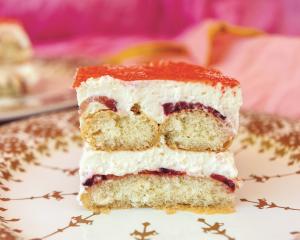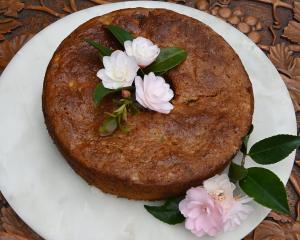
Three-year-old Fred Macfarlane Tweedie likes nothing better than munching on some rocket while in the family’s garden.
It is a sight that warms his mother’s heart.
‘‘It is important to me that Fred enjoys food,’’ Skye Macfarlane says.
That is because food is everything to the naturopath and herbalist.
‘‘Food is the reason I get up in the morning. I remember places we’ve been by the food we ate.’’
But she cannot work out were her fascination came from.
‘‘I’m so odd in my family. My mother and younger brother could eat the same thing day-in and day-out. I read cook books for fun. I can spend hours in a supermarket. I don’t where it came from. Anything to do with food I love.’’
When she travels, it is all about the food and she loves visiting markets and foreign supermarkets — much to the puzzlement of her husband.
Macfarlane and husband Jed Tweedie had not long moved to Dunedin having bought a piece of land at Mihiwaka when Fred was born.
The pair had been living in Auckland while Macfarlane completed her bachelor in natural medicine degree, but Tweedie, a design engineer at Fisher and Paykel, had always wanted to own some land having grown up on a farm.
‘‘He likes to grow things.’’
After seeing an ad online, the couple flew south to take a look and were soon the proud owners of what has become Vern Paddock Project. As the land had not been used, it only took them two years to get BioGrow certified.
When it came time to feed Fred solids, Macfarlane looked at what was available in the supermarkets trying to find options that were mostly vegetables and did not include fillers or sweeteners.
‘‘You can get organic pouches but none had fat included, which is important for stabilising blood sugar and brain health.’’
It confirmed to her that she was best to make Fred’s food at home.
Using her nutritional knowledge, she added spices — such as cinnamon, which aides digestion, coconut cream and kelp - to pureed vegetables.
‘‘So I made some and Fred ate everything.’’
The idea that other parents might be looking for a healthier alternative to baby food pouches led her to see if other babies liked the food. She asked 25 families to trial the food for a week and then take part in a survey.
‘‘Even the fussy kids liked it.’’
Recent research has shown that at four to six months babies are really receptive to different tastes, particularly bitter tastes, she says.
‘‘Introducing them to vegetables first, not sweet tastes, is supposed to be effective in the long term.’’
She admits Fred is lucky growing up on a farm where vegetables are grown, so it is nothing to him to be out in the vegetable patch.
‘‘He'll rip off a piece of kale. He knows what fennel is. He’s totally the herbalists’ son.’’
Children are quite receptive to parents’ attitudes to vegetables often picking up on their likes and dislikes but if different foods are put out for them to try, they often enjoyed them, she says.
‘‘Kids have to eat it, otherwise I’m just making parents’ lives harder.’’
She came up with the name for her product - Fred Fred - and set about making her baby food, creating a product with eight frozen portions of vegetable puree per bag.
‘‘It cuts down on the packaging waste. You can throw it in your freezer and when you don’t know what you are eating let alone what the children are, you can pull a serving out and they’re getting a massive amount of vege.’’
All of the vegetables are sourced from local suppliers and are certified organic. However, while her ingredients are organic, the product is not certified organic.
Fred Fred is now sold in three outlets in Dunedin as well as one each in Invercargill and Timaru, where Macfarlane is from.
With a $5000 Risingtide grant aimed at supporting business start-ups granted last year, Macfarlane is looking at expanding her range to snack foods for pre-school and school lunches.
‘‘I like making lunch, but I only have one child. It can be tiresome doing it day after day so if they can grab something out of the freezer [it makes life easier].’’
She has also made a breakfast cereal using Bay Rd Peanut Butter and a muffin with prebiotics, chia seeds and carob, which she is trialling at her stall at the Otago Farmers Market.
The growth of the business meant she left her ‘‘real life’’ job two years ago and now does contract work as a herbalist for Wild Dispensary and educator around the demands of Fred Fred.
She leaves the growing to Tweedie, who grows ‘‘green things’’ for wholesalers, instead helping out with photographs for social media and deliveries. Her responsibility are the edible flowers and herbs.
‘‘I’ve decided I’m not built for the fields. It’s hard work.’’
Growing more herbs is also in the works so she can build on a small project making herbal teas for local cafes.
It is a world away from the life she envisaged when she started her media degree with a view to career in journalism.
Disillusioned with that idea after university she worked as a team leader at legal aid, but when she went travelling it was with the idea of finding out what she wanted to do.
She thought about how going down a natural treatment path was one of the things that helped her father live longer after he was diagnosed with terminal cancer and how her sister had also followed that path when she got melanoma.
On her return to New Zealand, she trained as a naturopath and herbalist and discovered her real interest was in educating people.
She struggled with natural health services and treatments mostly only being available to people with money, not those in the most need.
‘‘I like talking to people about making more sustainable changes.’’
That was one reason she liked what Wild Dispensary was doing, trying to make their products sustainable and affordable.
‘‘I like hearing from people that have made small changes but they’ve worked.’’
The Dunedin community have been amazingly supportive of her new endeavour, she says. ‘‘We couldn’t have done this in Auckland.’’
 Photo: Getty Images
Everyday dahl
Photo: Getty Images
Everyday dahl

Ingredients
1 cup soaked lentils (soaked overnight)
2 Tbsp coconut oil
1 onion diced
3 garlic cloves diced
3 tsp cumin seeds
1 tsp cumin powder
1 tsp salt
1 tsp turmeric
2 heaped tsp garam masala
¼ cup sultanas (add more if you want)
2 Tbsp brown sugar
4 cups water
Optional
curry leaves and cayenne pepper
To serve
cooked rice
coconut yoghurt
Method
1. In a saucepan, melt the oil and add chopped onion and garlic. Fry until nice and golden (about 10 minutes).
2. Add all spices and salt. Mix around and add the brown sugar and sultanas.
3. Add soaked lentils and about 4 cups of water. I also add in a curry leaf and, if just adults eating, some cayenne pepper as well.
4. Cook until the liquid has been mostly absorbed (about 20 minutes).
5. Serve with cooked rice and coconut yoghurt
 Photo: Gregor Richardson
My favourite cake
Photo: Gregor Richardson
My favourite cake

Ingredients
½ cup Trade Aid golden sugar (normal sugar is fine)
60ml water
1 cup extra sugar
4 or 5 peaches (or nectarines/apples/pears/plums that have been cut into slices or halves)
180g coconut oil
1 tsp vanilla
3 free range eggs
⅓ cup desiccated coconut
1 cup brown rice flour
2 tsp of baking powder
zest of orange or lemon
⅓ cup coconut yoghurt
Method
1. Heat oven to 180degC.
2. Line cake tin with baking paper
3. In a saucepan, add half a cup sugar and 60ml water and stir well and bring to boil over high heat. Don't stir — let it caramelise at a low heat for about 5 minutes (or until it goes a golden brown colour).
4. Remove from the heat and pour over the base of the cake tin. Add the chopped fruit. You can add chopped thyme here if you wish.
5. Melt the coconut oil, add into a bowl with everything else. Mix thoroughly.
6. Pour over the fruit and caramel.
7. Bake for 50 minutes (or until it is cooked through).
8. Let cool for 10 minutes and invert the cake on to a plate.













